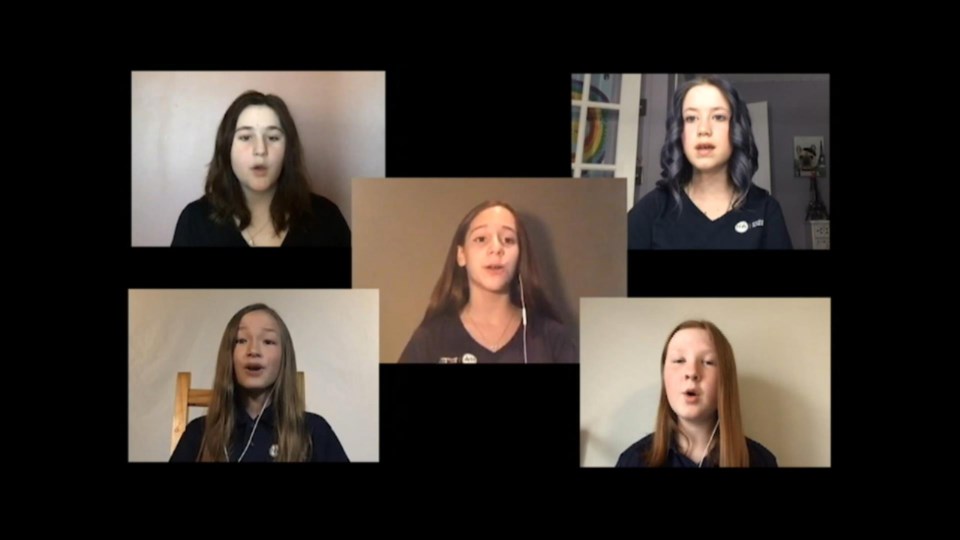Yesterday, we told you about Northern Arts Academy and how music classes have managed to continue during the pandemic.
We talked to Paul Dingle, Northern Arts Academy (NAA) co-director/piano instructor, and Skye Smith, NAA movement and acting coach.
Here's the (abridged) interview behind the story:
Q: Tell us about yourselves.
A: (Dingle) My wife Agnes McCarthy and I moved here in 1992 (from Montreal) and we started the Northern Arts Academy in 2015. We’ve both been involved in community musical theatre and we wanted to shift our instruction direction towards what we call the ‘Triple Threat.’ For anybody who’s a modern stage performer in a musical you need to be able to act, sing and dance. It’s not enough to have one skill in that stage performance environment.
A: (Smith) I was born and raised in the Sault and started with the Northern Arts Academy in 2016. I went to the Sherry Walsh Academy of Dance, studied voice at Algoma University and acted in community theatre. It’s my passion, so that’s what I teach.
Q: Which artists have inspired you?
A: (Dingle) Pianists like Horowitz, Pollini, Angela Hewitt, Oscar Peterson, there are so many.
A: (Smith) I love Liza Minelli, and Lea Michele, who was in Glee. Those are two big ones for me.
Q: How has it been for you to teach music, voice, dancing and musical theatre remotely during COVID-19?
A: (Dingle) It’s a big challenge, working online, that everyone’s had to adapt to. This new online life has its challenges in every endeavour but it seems in the arts it’s particularly challenging. One of the great benefits (of remote learning and teaching) is location doesn’t matter. You can be anywhere in the world and still make it work. That’s allowed us to keep working through all these challenges. Our kids are so into their lessons. We’ve invested quite a bit into new technology and changed our teaching methods, but we’ve made those changes.
Our students now are learning how to record themselves and look and listen to themselves critically and how they can improve. COVID has kind of put that to the forefront. We’re all adaptable, and the kids are the most adaptable of all. It’s impressive.
For us, there was a poignancy to it because we had just moved into this new space on East Street. We found a perfect space for everything we wanted to do. It’s a three-storey house. The owner has been an absolute angel, so supportive. The lighting in here is beautiful, it’s such a beautiful space for learning. We miss having the kids here, but when health requirements change and once the vaccine is in circulation (we’ll be back).
We work on a piece a month. We do our online rehearsals and then when it’s ready we find an outdoor space in our community where we can safely social distance and actually do a recording of the piece we’ve been working on. We just did a recording in Bellevue Park at the bandshell. It made the students so incredibly happy to be able to do that.
A: (Smith) It was very difficult at first. So much of acting is being around people, so it was a lot of time spent making it work instead of ‘folding.’ (Remote learning and teaching) has kept me going and kept me connected with my art, with my craft.
A: (Dingle) I echo that 100 per cent. The only option was to keep moving ahead or fold.
A: (Smith) I had a student who had a sleepover at her uncle’s and she was still able to come into class, all she needed was the link and her laptop, and her attendance has been so good, she doesn’t want to miss it.
I think the students love it. With Zoom they can look at themselves. It’s your stage when you’re offstage. It’s your ‘box.’ My lessons are live (but) they record their assignments. If they do a take and they don’t like it they can do it again. They’re acting for a camera. It’s been an amazing year for them and for me so far.
Q: So COVID and remote teaching hasn’t taken away your love for music and performing?
A: (Dingle) No. Art is one of the many vehicles that connects people and as long as human to human contact is relevant...I’m thankful for these tools like Zoom.
(Smith) No. It (remote teaching) has made it easier to prepare myself for delivering lessons. You just kind of have to figure out how it’s going to make life better as opposed to all the difficulties with it.
A: (Dingle) The one thing I’ve learned is to buy a comfortable office chair. Spare no expense (laughs).
Q: What is the age range of your students?
A: (Dingle) From six to sixty. A lot of our students go on to careers in the arts and we keep in touch.
